Where does this terrible knocking come from? What to do if the heating radiators are noisy
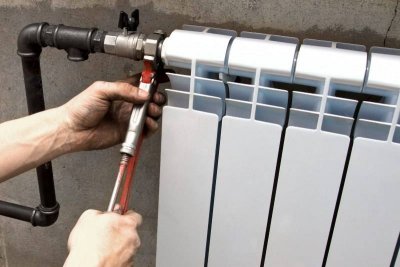
The operation of the central heating is practically unnoticeable for city dwellers. However, the slightest deviations from the norm can cause panic.
Meanwhile, a correctly installed system of pipes and heating batteries works unnoticed and silently. The emergence of extraneous sounds from heating elements signals the occurrence of a malfunction.
What sounds do batteries make?
Conventionally, the noise coming from the battery, are divided by the nature of the sound to knocks, hums, clicks, gurgles.
Knocks
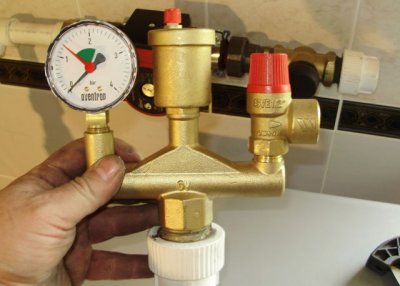
The knocking comes from the battery as from the element of the system with the largest flat surface. In fact, the source of the sound is located elsewhere.
The main reason for the knocking noise is uneven pressure in different sections of the pipeline.
Under high pressure, the coolant is supplied to the system, but, meeting narrowed fragments on its way, it tries to overcome them. This is where the knocking occurs.
The diameter of a pipeline section can decrease for several reasons:
- There is no bypass — a jumper connecting the supply and outlet pipes before the radiator. Many residents replace heating sections by inviting various craftsmen or by themselves. When replacing steel pipes with polypropylene, they do not always consider it necessary to install a bypass. A jumper can only be installed by redoing a new section.
- A smaller diameter shut-off valve has been installed or his the working diameter has narrowed due to poor quality of hot water. When a shut-off valve is used to regulate the heating of a radiator, a similar effect is obtained. In the simplest case, you need to open the valve completely. If this does not help, you should clean the gap in the valve or install a valve with a larger working diameter.
- There are air pockets in the battery. Excess air is released using the Mayevsky valve at the end of the battery.
- The problem lies in the heating radiator — a jet pump that increases pressure. Incorrect operation of the elevator can cause unstable coolant pressure in the entire circuit. Residents themselves cannot fix problems in the elevator, and they do not have the right. The management company is responsible for servicing common heating units. A call to the dispatcher will help solve the problem.
Important! All work related to replacing old or installing additional elements of the heating system is allowed to be carried out only after draining all liquid from the pipeline. Draining water and then refilling the system is allowed only to employees of the service organization.
Humming
The hum, sometimes similar to a whistle, can be caused by several reasons:
- When water passes under pressure through the battery turbulent eddies are formed due to air bubbles. A sign of airiness is uneven heating of sections. It is eliminated by removing air through Mayevsky crane.
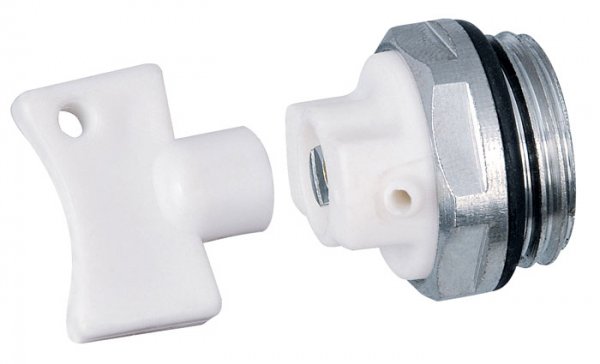
Photo 1. Mayevsky tap, allowing you to easily release excess air from the heating system.
- Too much pressure after the circulation pump in high-rise buildings, Incorrect operation of the pressure regulator. It is fixed by a plumber from the management company.
- Increased vibration of the circulation pump is transmitted through pipes into the apartment premises. This is again the fault of the management company employees, and they are the ones who have to fix the problem.
- Severe coolant leak in the heating circuit outside the apartment. If you find it, you should contact the service organization.
- The hum is created worn rubber seals in shut-off valves or in connecting couplings. The defect is eliminated at the expense of the residents, if the tap is located in the apartment, or by an employee of the management company at the connection points of the common nodes of the heating circuit.
Clicks
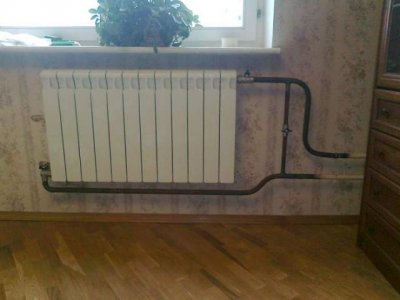
After replacing the radiator, sometimes clicks similar to shots are heard in the battery. The reason is that the metal of the pipe and the radiator have a different structure and a different coefficient of thermal expansion.
When the heating temperature changes, microdeformation of the connection of two metals. This does not lead to the destruction of the elements, but it causes a lot of unpleasant sensations.
During the reverse process - cooling, the situation is exactly the same. It will not be possible to completely eliminate the problem, but its manifestations can be reduced. To reduce the unevenness of metal expansion A heat insulator made of porous material, merelon, is placed on the pipes.
Reference. Even when using metals with the same thermal expansion, similar clicks can occur. This consequences of incorrect installation of elements heating systems.
Deformation due to temperature changes occurs in the transverse direction relative to the pipes or the battery in the complex. When two riser pipes are located too close to each other, almost touching, deformation causes them to collide, accompanied by a click.
Murmur
A strange gurgling sound appears in the pipe system due to the presence of foreign solid impurities in the coolantWhen this debris touches the walls of the pipes, it produces a rustling sound that is perceived as gurgling.
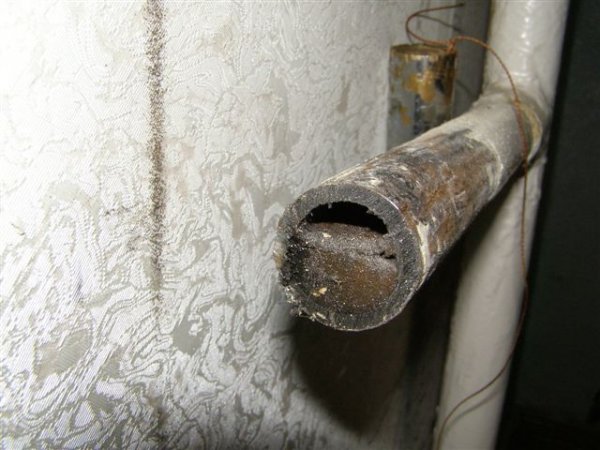
Photo 2. Dirt accumulation in radiators. This causes gurgling sounds in the heating system.
The defect can only be corrected complete replacement of the coolant in the circuit with simultaneous cleaning of the heating system. During the heating season, such a process cannot be done due to its long duration. No one will allow the heat supply to be suspended in winter unless there is an emergency.
Attention! Unless you are a heating system specialist, you must not interfere with their operation. Incorrect actions may lead to serious problems.
Sources of noise
Although extraneous sounds most often come from radiators, the sources of extraneous sounds may not only be batteries. Probable places where noise occurs:
- supply pipes;
- heating risers;
- brackets and other fasteners;
- circulation pumps;
- heating boilers.
The pipes running from the risers to the radiators knock and click, if they come into contact with other metal parts or with the wall surface. If the pipe bend radius is incorrect, noise will appear in it due to high pressure in the system.
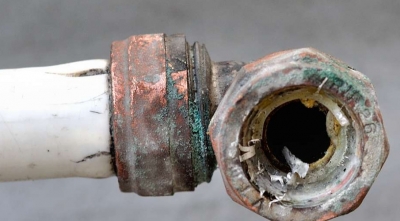
Over the years of operation, risers accumulate deposits on the inner surface, reducing the effective diameter of the pipeline. This also causes noise in the pipes.
The brackets for fastening the radiators and pipes should only support the structures. The attractive force creates additional deformation of elements, that's where the clicks come from.
In high-rise buildings, circulation pumps are used to increase the pressure in the circuit. Vibration due to incorrect installation of the pump motor is transmitted through pipes to apartments. Excessive pressure due to improper adjustment of the pump operation causes noise.
The operation of heating boilers in centralized boiler houses does not cause any trouble in the form of noise. Individual boilers located in apartments, in some cases, produce sounds of vibration of boiling water or built-in pumps.
Useful video
Watch the video, which talks about possible causes of noise in batteries and offers solutions to the problem.
What to do if the heating batteries are noisy?
If you hear strange sounds from the battery, you may perform simple manipulations on your own. First of all, check how the shut-off valve works by turning it several times from one extreme position to the other and back. Difficulty in turning the shut-off valve indicates that it is not working properly. Replacing the rubber gasket in the valve gives a good result.
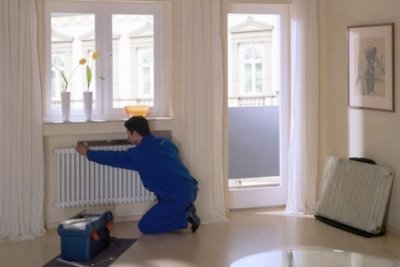
Next, they carry out thorough inspection of pipes and radiators. It is possible that a fragment will be found with a lower temperature than neighboring areas.
It makes sense to place rubber inserts between the contacting pipes or the radiator and its mount. This will eliminate the cause of knocking and clicking.
If the noise does not stop, you should seek help from a management company specialist. You should not try to interfere with the operation of the entire heating system, this can harm both yourself and your neighbors.







Comments